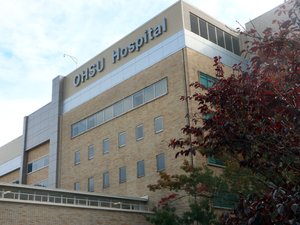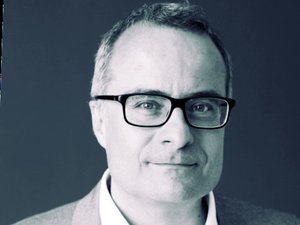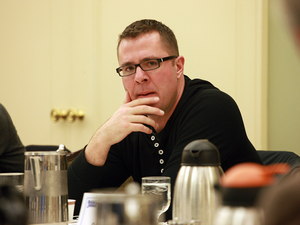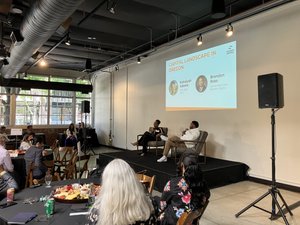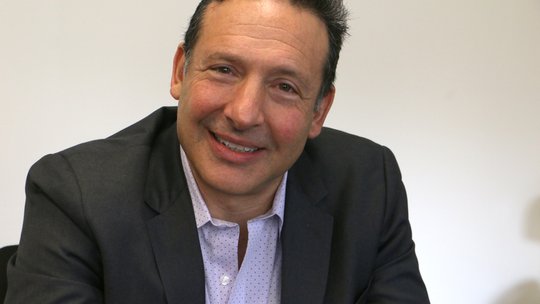
Dr. Dave Sanders, the founder and onetime face of ZoomCare, is back, five years after selling the ubiquitous chain of neighborhood clinics and retreating from the headlines.
Sanders’ new ambition hasn’t changed: nothing less than a remaking of what he views as a dysfunctional U.S. health care system.
“We’re super lost today, never more lost about health care than this moment,” Sanders said in an interview last week. “We’re just spreading the same amount of premium thinner and thinner, and people are getting less and less care.”
Rather than a chain of bright blue brick-and-mortar clinics, Sanders’ current vehicle is a startup called CodyMD, combining AI “doctors” and human doctors.
As Sanders sees it, AI is “tailor made for health care,” though the first wave was limited mainly to the hospital and insurance realm.
“We may be the first in the world to go all in on the consumer side,” Sanders, who serves as CEO, said. “This is a continuation of the ZoomCare work. We see it as finishing what we started and putting the consumer at the center of this world and make the system serve at their beck and call. Everything I’m saying is baked into the design.”
Building on Zoom
Sanders has kept a low profile since he and his longtime friend and business partner Dr. Albert DiPiero sold Zoom to PeaceHealth in late 2018 for an undisclosed sum, a dozen years after opening the first urgent care clinic in the Bridgeport Village mall. They built Zoom into a chain of 37 “on demand” clinics around Portland and Seattle and were trailblazers with technology, with online scheduling and provider chats. Sanders gained a reputation as a provocateur who was unafraid to take on the health care establishment.
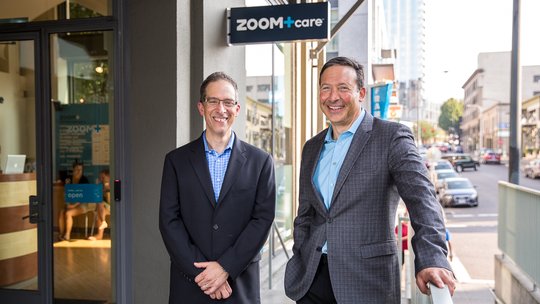
There were also a few stumbles. The state reined in Zoom’s “Super” clinic, a stepped-up urgent care clinic that was barred from billing itself as an emergency care provider. A foray into insurance ended in receivership. Then there was a very public battle for control of the company between the founders and their largest investor, Endeavour Capital.
Sanders and DiPiero, who mostly stays in the background, shifted gears after selling Zoom and formed a venture called Awesome Studio to assemble “a portfolio of business inventions” that they would self-fund and launch. They toyed with some ideas, but nothing came close to the next Zoom, Sanders said.
“Most things were okay, and you could force them to be successful, but it wasn’t quite right,” Sanders said.
As he and DiPiero, who serves as chief medical officer, put it on the Cody website: “We didn’t want to do something that was good. We wanted to do something great — something with the potential to fundamentally solve our hopelessly dysfunctional ‘health system,’ something that truly places people at the center.”
Will an AI doctor catch on?
Early versions of Cody — variously called Be Your Own Doctor and Dear Doctor AI — were based on inference models, but “none of them were really that good,” Sanders said.
Then in November 2022, language models emerged that made the technology more effective, Sanders said. A free test version of Cody launched globally last August. Sanders was driving around Ireland when he learned that Cody had attracted its first user.
“The hardest thing about starting something like this is finding something people care about,” Sanders said. “I was sitting there crying because people were into it and really cared about it.”
Tom Davenport, a distinguished professor of IT and management at Babson College who wrote a 2019 article on potential for AI in health care, said a similar platform has been “extremely successful” in China. It may be some time before something like this catches on in the U.S., he said
“There’s nothing like this in this country, and I don’t think there will be for a while,” Davenport said. “I think most patients won’t trust it at first, until they get used to the idea. I don’t think the AI is good enough to do it without a lot of doctors. Eventually, it will happen, but they will need a high level of patience.”
Yet a free version of Cody, which was built in house, has garnered 400,000 users globally, with no significant marketing but people finding it through web searches or word of mouth, Sanders said.
He described the people using Cody as “the great unheard.”
“They go to the doctor and get the eye rolls, the dismissals, unless it fits in a tight procedural box that can be treated and cured,” he said. “We want to be very good technically, but our focus is people who feel the system is not for them. We’re here, our ears are open and we’re sympathetic. That’s the vibe we’re trying to create.”
The site is designed to mimic the process a patient goes through with a living, breathing licensed doctor, asking a series of questions about symptoms and returning an answer with, say, 80% confidence. The startup also introduced a membership, where a $4.99 monthly fee gets someone full access to all AI doctor tools.
So far, subscriptions are available just in those states where CodyMD recently created doctor networks: California, Oregon, Washington and Michigan. For a $39 fee, a doctor will review the Cody discussion, ask more questions and send the patient a treatment plan, including labs and medications.
This is no “Doctor Google” or WebMD, Sanders said.
“This next generation goes beyond informational and goes all the way from interactive engagement to care itself,” Sanders said. “A whole new era is being ushered in. The dream doctor is what everyone wants, the doctor who knows you by name, like having a specialist in your pocket, the perfect therapist available to you and wellness coach. And we’re going to make that ideal flow like water.”
The future of Cody
Sanders anticipates the medical profession will see Cody as a threat to their livelihood, a stance he's encountered before.
“You’ll see claims that bad things will happen,” Sanders said. “It's in society’s interest to try to keep moving the marker. Physicians are in a structural shortage, so yes, we would like to get to a point where the AI doctor can do more and more.”
Cody may eventually connect a patient’s existing health records, he said.
“Every week as we improve it, Cody knows who you are, knows more about you and will suggest ways to be healthier,” Sanders said. “It becomes increasingly proactive.”
Unlike Zoom, Sanders said he has no intention of selling CodyMD, or even raising traditional capital.
“I’m also trying to run it in a way that’s realistic,” he said. “If we continue to progress it, it will be self-sustainable.”

